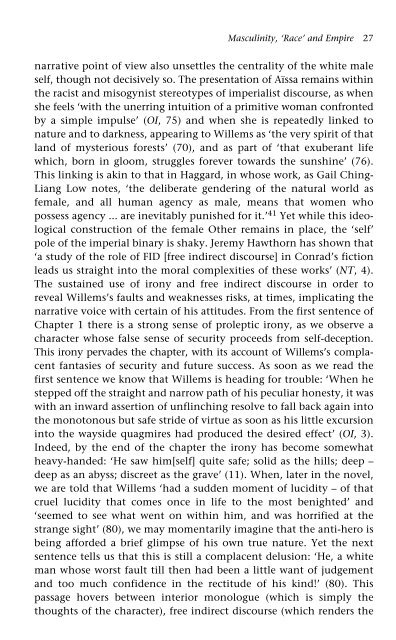Conrad and Masculinity
Conrad and Masculinity
Conrad and Masculinity
You also want an ePaper? Increase the reach of your titles
YUMPU automatically turns print PDFs into web optimized ePapers that Google loves.
<strong>Masculinity</strong>, ‘Race’ <strong>and</strong> Empire 27<br />
narrative point of view also unsettles the centrality of the white male<br />
self, though not decisively so. The presentation of Aïssa remains within<br />
the racist <strong>and</strong> misogynist stereotypes of imperialist discourse, as when<br />
she feels ‘with the unerring intuition of a primitive woman confronted<br />
by a simple impulse’ (OI, 75) <strong>and</strong> when she is repeatedly linked to<br />
nature <strong>and</strong> to darkness, appearing to Willems as ‘the very spirit of that<br />
l<strong>and</strong> of mysterious forests’ (70), <strong>and</strong> as part of ‘that exuberant life<br />
which, born in gloom, struggles forever towards the sunshine’ (76).<br />
This linking is akin to that in Haggard, in whose work, as Gail Ching-<br />
Liang Low notes, ‘the deliberate gendering of the natural world as<br />
female, <strong>and</strong> all human agency as male, means that women who<br />
possess agency ... are inevitably punished for it.’ 41 Yet while this ideological<br />
construction of the female Other remains in place, the ‘self’<br />
pole of the imperial binary is shaky. Jeremy Hawthorn has shown that<br />
‘a study of the role of FID [free indirect discourse] in <strong>Conrad</strong>’s fiction<br />
leads us straight into the moral complexities of these works’ (NT, 4).<br />
The sustained use of irony <strong>and</strong> free indirect discourse in order to<br />
reveal Willems’s faults <strong>and</strong> weaknesses risks, at times, implicating the<br />
narrative voice with certain of his attitudes. From the first sentence of<br />
Chapter 1 there is a strong sense of proleptic irony, as we observe a<br />
character whose false sense of security proceeds from self-deception.<br />
This irony pervades the chapter, with its account of Willems’s complacent<br />
fantasies of security <strong>and</strong> future success. As soon as we read the<br />
first sentence we know that Willems is heading for trouble: ‘When he<br />
stepped off the straight <strong>and</strong> narrow path of his peculiar honesty, it was<br />
with an inward assertion of unflinching resolve to fall back again into<br />
the monotonous but safe stride of virtue as soon as his little excursion<br />
into the wayside quagmires had produced the desired effect’ (OI, 3).<br />
Indeed, by the end of the chapter the irony has become somewhat<br />
heavy-h<strong>and</strong>ed: ‘He saw him[self] quite safe; solid as the hills; deep –<br />
deep as an abyss; discreet as the grave’ (11). When, later in the novel,<br />
we are told that Willems ‘had a sudden moment of lucidity – of that<br />
cruel lucidity that comes once in life to the most benighted’ <strong>and</strong><br />
‘seemed to see what went on within him, <strong>and</strong> was horrified at the<br />
strange sight’ (80), we may momentarily imagine that the anti-hero is<br />
being afforded a brief glimpse of his own true nature. Yet the next<br />
sentence tells us that this is still a complacent delusion: ‘He, a white<br />
man whose worst fault till then had been a little want of judgement<br />
<strong>and</strong> too much confidence in the rectitude of his kind!’ (80). This<br />
passage hovers between interior monologue (which is simply the<br />
thoughts of the character), free indirect discourse (which renders the




